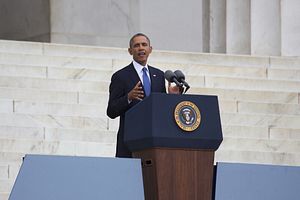Pyongyang, Moscow and Beijing are on notice: There’s a new sheriff in town and he’s taking names. Barack Obama’s message to Kim Jong-un is clear: Though I only have two years left, I am not your grandfather’s lame-duck U.S. president. (Harry Truman reacted to Kim Il-sung’s attack on South Korea by reversing the aggression but getting mired in a no-win ground war.)
The president intends instead to respond to North Korea’s cyber-attack on Sony Pictures – which he called “vandalism” rather than an act of war – at a time, place and in a “proportionate” manner, of his choosing. But a price will surely be paid for what Kim has done.
This sounds like the kind of “smart” foreign policy Obama claims to be comfortable with, avoiding doing “stupid stuff” – like enforcing the “red line” he set in Syria (even as 200,000 Syrians died in what has been called Obama’s Rwanda).
The president is also relishing Vladimir Putin’s mounting economic problems as the ruble crumbles under the weight of falling oil prices and U.S. sanctions. He admonished CNN that Putin doesn’t look quite as clever as he did weeks ago when pundits credited him with “rolling” Obama on Ukraine. The president didn’t hide his satisfaction at that turn of events.
Even his decision to reverse America’s Cuba policy is an act of defiance – not against Fidel and Raoul Castro, but against the Republicans in Congress whose ranks are about to swell after the November election. Rather than feeling chastised by the American public’s overwhelming rejection of his party and policies, Obama seems to believe the worst has already happened to his political fortunes – in a parliamentary system, he would already be out of office – and no further personal or party elections await.
Liberated by defeat, he feels he no longer has to please either his Democratic base or potential Republican collaborators in Congress. So, on immigration, withdrawal from Afghanistan, releasing Guantanamo prisoners, or Cuba policy writ large, he can start going for the long ball, maybe even throwing a few Hail Marys, as he enters his tenure’s fourth quarter.
Whether this is all a new form of presidential swagger and bravado, or a serious, thoughtful, and confident commitment to address large issues decisively, remains to be seen. But leaders in Russia, North Korea, Iran and China would be well-advised to reevaluate their dismissal of Obama’s waning potency.
After North Korea, China will have the most to worry about if the new Obama proves to be the real thing – because of its own record of cyber aggression and its deep involvement in Pyongyang’s. It is well-known that North Korea’s cyber capabilities are entirely dependent on China’s sophisticated systems.
What Kim Jong-un did to Sony almost certainly could not have happened without Xi Jinping’s knowledge and explicit or tacit approval. This collusion is of a piece with Beijing’s overall support for three generations of Kim family’s domestic and foreign outrages.
Only China has the economic and diplomatic leverage to stop North Korea’s nuclear and missile programs and it has chosen not to exercise it. Its public excuse, accepted by many in the West, is that exerting too much pressure over Pyongyang could destabilize the regime. Yet, Beijing will not even bring itself to condemn North Korea’s atrocious human rights record. China and Russia were the two outliers as the Security Council voted 11-2 yesterday to place the issue on the agenda.
Beijing gets away with the argument that it “needs” the North as a buffer against the “threat” from peaceful, democratic South Korea. A more sinister explanation is that China has benefited strategically as North Korea has distracted Washington and positioned China as an indispensable negotiating partner and “responsible stakeholder.”
Now that Pyongyang’s aggression is becoming more U.S.-specific in its targeting, Washington has no choice but to act in both self-defense and deterrence. The test of Obama’s seriousness in leaving a positive and decisive foreign policy record will be his exertion of pressure against the North’s enablers in Beijing. Labeling the Chinese as co-cyber-vandals, if not outright cyber-aggressors, will set the predicate.
Fond as he is of undoing his predecessor’s foreign policy positions, Obama should savor the opportunity to be tougher on Pyongyang than the Bush Administration was. He should immediately reverse the unfortunate 2008 decision to remove North Korea from the list of state sponsors of terrorism. But that should only be the minimum initial U.S. response to both North Korea and China.
Fittingly, if Obama does shift to a more muscular foreign policy, he will find his strongest support among his domestic policy opponents, Republicans in Congress – and resurgent national security bipartisanship will go a long way to restoring American credibility in Pyongyang, Beijing, Moscow, and other troublesome precincts.
Joseph A. Bosco is a member of the U.S.-China task force at the Center for the National Interest and a senior associate at the Center for Strategic and International Studies. He previously served as China country desk officer in the office of the secretary of Defense from 2005-2006.
































